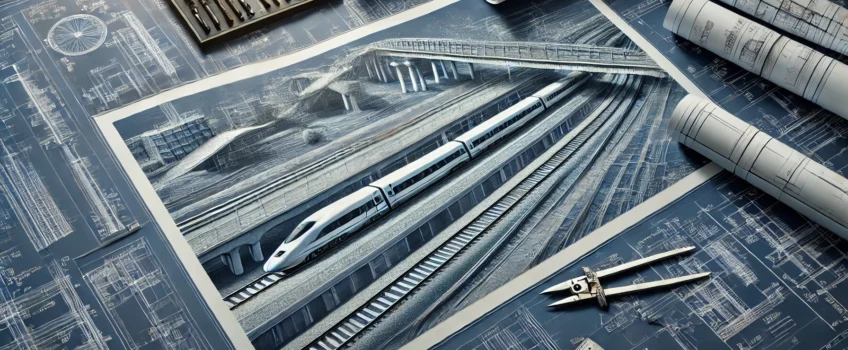
The HS2 Rail Project: Progress, Challenges, and the Future of UK Infrastructure
The HS2 rail project is one of the most ambitious large-scale engineering projects in UK history, designed to drastically improve connectivity between London, Birmingham, Manchester, and Leeds. While it promises to bring significant benefits to the UK’s transport infrastructure, the project has encountered numerous challenges, from escalating costs to political opposition. In this article, we’ll examine the current status of the HS2 rail project, the obstacles it faces, and what the future may hold for rail construction in the UK.
What is the HS2 Rail Project?
The HS2 rail project was initially conceived as a high-speed rail line that would cut travel times and increase capacity between the UK’s major cities. It was designed to support the growing population’s needs while providing a sustainable alternative to road and air travel. The project was expected to be delivered in two phases: Phase 1 linking London and Birmingham, and Phase 2 extending the line to Manchester and Leeds.
However, despite its grand vision, the HS2 rail project has faced a series of delays, cost overruns, and political scrutiny. As a result, the project has been subject to ongoing debate and controversy. Let’s take a closer look at some of these challenges.
Challenges Facing the HS2 Rail Project
The HS2 rail project has been subject to intense scrutiny, primarily due to the significant increase in its projected budget. Initially, the estimated cost was around £33 billion, but this has since ballooned, with estimates now suggesting the total project could cost upwards of £100 billion. As of April 2024, the UK government has spent £27 billion on the project, a figure that is likely to rise as construction progresses.
Another challenge comes in the form of political and public opposition. Many critics argue that the funds allocated to HS2 could be better spent on improving regional transport links or other large-scale engineering projects. The project’s environmental impact has also been a key point of contention, with concerns about the destruction of ancient woodlands and wildlife habitats.
Technical difficulties have also hindered progress. The complexity of tunnelling, land acquisition, and dealing with different local authorities has caused further delays in rail construction. These issues have forced the government to reassess the viability of certain sections of the project, particularly in northern England, where some routes have been scaled back.
Could Part of the Project Be Revived?
Despite these setbacks, there are discussions about the potential revival of certain aspects of the HS2 rail project, particularly in the Midlands and northern sections. The UK government has expressed interest in exploring ways to deliver part of the project at a reduced cost by prioritising the most critical routes and delaying or cancelling other sections.
For instance, a revived northern route could bring much-needed economic development to cities like Manchester and Leeds. The completion of Phase 1, between London and Birmingham, is already well underway and is expected to boost transport capacity between these two key hubs. However, the broader question remains whether the political will and financial backing will be available to complete the entire HS2 network.
PRV Engineering’s Role in Rail Construction and Engineering Services
While PRV Engineering is not directly involved in the HS2 rail project, the company plays a vital role in the broader UK rail construction industry. With decades of experience in providing engineering and manufacturing services to the rail sector, PRV produces components for track, track-laying, and maintenance equipment. We also supply electrical connections, contacts, and other rolling stock products to companies such as Transport for London and the Underground Rail Network.
The rail industry requires precision-engineered components for a range of applications, including signalling systems, rail infrastructure, and safety-critical parts. PRV Engineering’s services include machining, fabrication, and assembly, ensuring that the essential elements of modern rail networks are manufactured to the highest standards.
By offering reliable, high-quality engineering solutions, PRV helps to maintain and develop the UK’s rail infrastructure. This ensures that future projects—whether on the scale of HS2 or smaller regional improvements—can benefit from cutting-edge engineering practices and products that support the safety and efficiency of the rail network.
Looking Forward: The Future of the HS2 Rail Project and UK Rail Construction
The future of the HS2 rail project is still uncertain, but one thing is clear: the UK’s need for modern, efficient rail infrastructure remains a priority. Whether the project is completed as originally envisioned or scaled back, the lessons learned from HS2 will influence the planning and execution of future large-scale engineering projects across the UK.
For companies like PRV Engineering, which provides critical support to rail construction projects, the demand for precision engineering services will continue to grow as the UK invests in its rail network. As the country navigates these challenges and opportunities, the need for reliable engineering solutions will be more important than ever.
If you liked reading this article, be sure to check out our blog page for more interesting articles on engineering and manufacturing. You can also follow us on social media for regular updates and insights into the world of precision engineering.


 Mail:
Mail: 



